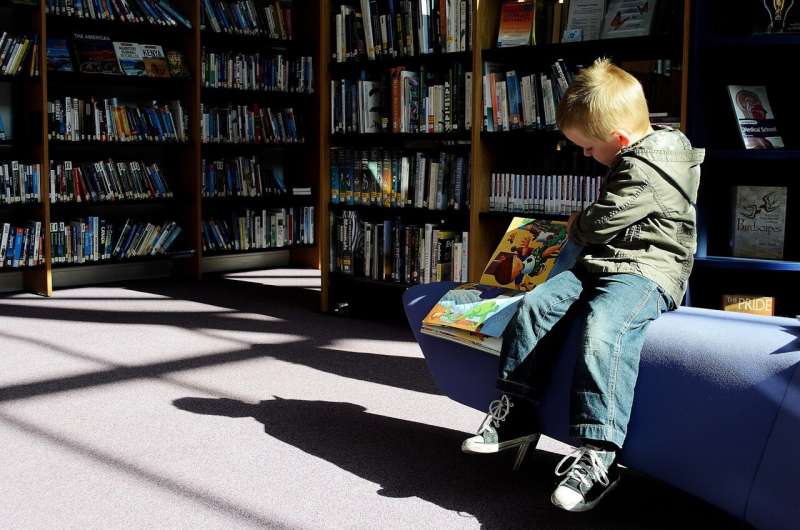Science
Book Bans Hinder Literacy Growth, Says University of Rhode Island Study

Recent research from the University of Rhode Island highlights the detrimental impact of book banning on literacy rates among students. In an article published in the journal Literacy Today, Danielle Dennis, dean of the Feinstein College of Education, argues that limiting access to books directly correlates with declining reading volume and achievement.
According to the National Assessment of Educational Progress, students who engage in daily recreational reading score significantly higher in reading assessments compared to their peers who seldom read for pleasure. Dennis emphasizes that reading volume is a crucial predictor of academic success, and access to literature plays a vital role in fostering this volume.
Access to Literature Under Threat
The rise in book bans, as noted by Dennis, severely undermines students’ access to diverse literature. Such measures not only restrict the availability of books that resonate with students’ interests but also alienate them from the reading experience altogether. “When reading volume declines due to restricted access,” Dennis states, “the consequences ripple across a child’s academic life.”
The effects of book bans extend beyond students. Librarians and educators may feel pressured to self-censor or avoid recommending specific titles to prevent backlash, further limiting the range of literature available to students. This self-censorship diminishes opportunities for meaningful classroom discussions and critical engagement with diverse texts.
Dennis, whose career began as an elementary teacher in Minnesota, argues that exposure to a wide variety of books is essential for developing reading proficiency. She warns that a lack of books on classroom shelves puts students at risk of falling behind.
Strategies to Promote Literacy
In response to the challenges posed by book banning, Dennis outlines several strategies for educators, parents, and policymakers. These include:
1. Supporting policies that protect students’ rights to access diverse literature and opposing censorship efforts.
2. Ensuring that book collections encompass a wide range of voices, experiences, and genres to engage all readers.
3. Allowing students to select their own books during independent reading time to enhance motivation.
4. Collaborating with local libraries to expand access to books, particularly in underfunded school districts.
5. Creating a family culture that values reading by dedicating time for shared reading experiences and discussions.
“Reading volume is a critical driver of academic achievement, personal growth, and lifelong learning,” Dennis asserts. She stresses that when children read widely and frequently, they acquire the skills and knowledge necessary for success both in school and in life.
Dennis’s research focuses on enhancing professional literacy education and leveraging assessment data to inform instructional practices. She concludes, “Reading is a cornerstone of cognitive development, academic success, and lifelong learning.”
As the conversation around book banning continues, it is crucial to recognize the importance of protecting children’s right to read freely and access a rich array of literature.
-

 Lifestyle3 months ago
Lifestyle3 months agoLibraries Challenge Rising E-Book Costs Amid Growing Demand
-

 Sports3 months ago
Sports3 months agoTyreek Hill Responds to Tua Tagovailoa’s Comments on Team Dynamics
-

 Sports3 months ago
Sports3 months agoLiverpool Secures Agreement to Sign Young Striker Will Wright
-

 Lifestyle3 months ago
Lifestyle3 months agoSave Your Split Tomatoes: Expert Tips for Gardeners
-

 Lifestyle3 months ago
Lifestyle3 months agoPrincess Beatrice’s Daughter Athena Joins Siblings at London Parade
-

 World3 months ago
World3 months agoWinter Storms Lash New South Wales with Snow, Flood Risks
-

 Science4 months ago
Science4 months agoTrump Administration Moves to Repeal Key Climate Regulation
-

 Science2 months ago
Science2 months agoSan Francisco Hosts Unique Contest to Identify “Performative Males”
-

 Business3 months ago
Business3 months agoSoFi Technologies Shares Slip 2% Following Insider Stock Sale
-

 Science4 months ago
Science4 months agoNew Tool Reveals Link Between Horse Coat Condition and Parasites
-

 Sports3 months ago
Sports3 months agoElon Musk Sculpture Travels From Utah to Yosemite National Park
-

 Science4 months ago
Science4 months agoNew Study Confirms Humans Transported Stonehenge Bluestones









